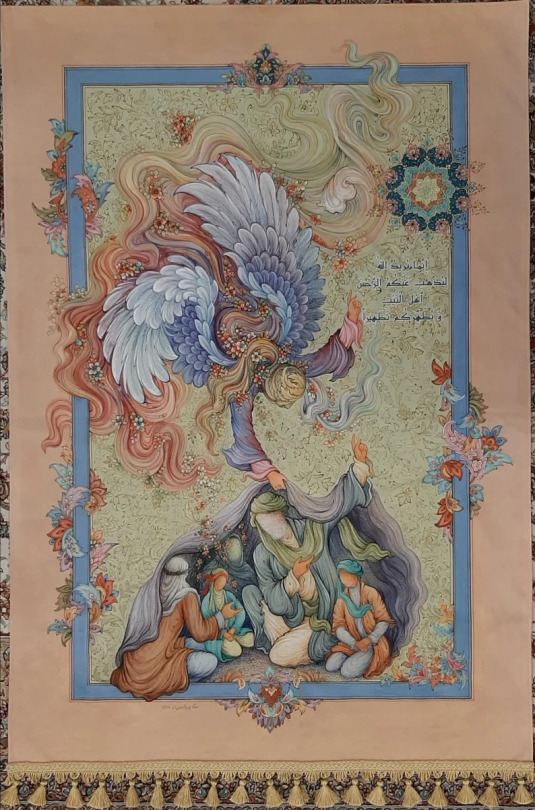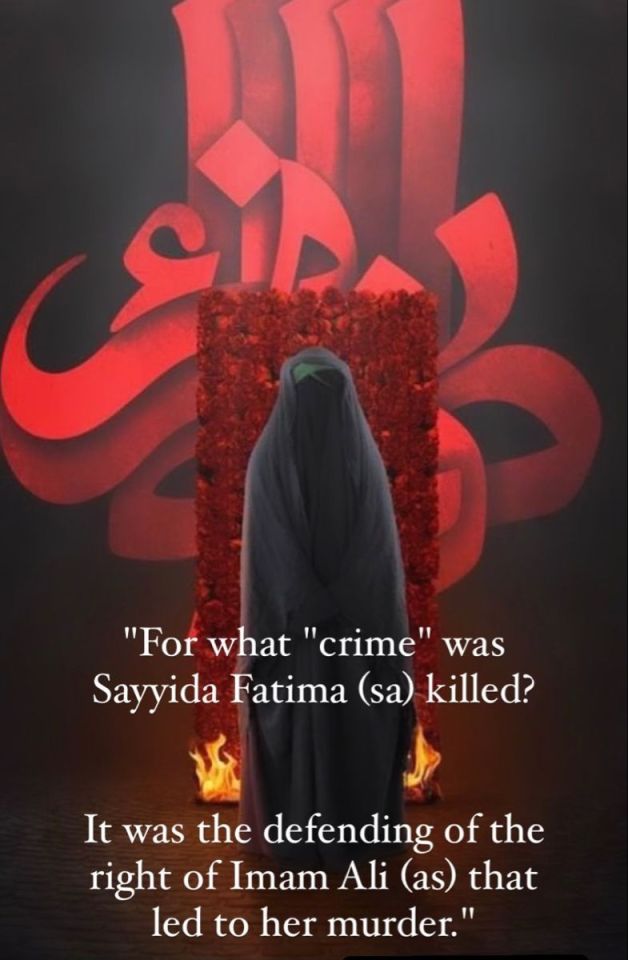#Ahl al-Bayt
Explore tagged Tumblr posts
Text

💡✨ The Lion of Karbala: Abbas Ibn Ali (PBUH) 🦁🌙
📝 Title: The Lion of Karbala: Abbas Ibn Ali (PBUH) - A Legacy of Bravery and Devotion
🧑🔬 Bio: I’m Muhammad Faisal Hussaini, an artist dedicated to capturing the essence of Islamic heritage and culture through my work. Join me as we explore the life of Abbas Ibn Ali (PBUH), a paragon of courage and faith.
🔖 Label: Islamic Heritage, Historical Figures, Inspirational Stories
🎯 Tags: Abbas Ibn Ali, Karbala, Islamic History, Maula Ali, Battle of Karbala, Shia Islam, Abbas Alamdar, Islamic Heroes, Ahl al-Bayt, Islamic Culture
#️⃣ Hashtags: #AbbasIbnAli #Karbala #IslamicHistory #MaulaAli #BattleOfKarbala #ShiaIslam #AbbasAlamdar #IslamicHeroes #AhlAlBayt #IslamicCulture
😇 Category: Islamic Heritage & Culture
The Lion of Karbala: Abbas Ibn Ali (PBUH) - A Legacy of Bravery and Devotion
Abbas Ibn Ali (peace be upon him), the son of Imam Ali (peace be upon him) and Umm al-Banin, is a revered figure in Islamic history, particularly among Shia Muslims. Known for his unwavering loyalty, exceptional bravery, and deep faith, Abbas played a pivotal role in the Battle of Karbala, a defining moment in Islamic history.
Early Life and Lineage
Born on 15 May 647 CE in Medina, Abbas was the son of Imam Ali, the fourth caliph in Sunni Islam and the first Imam in Shia Islam, and Fatima bint Hizam, known as Umm al-Banin1. From a young age, Abbas was known for his striking resemblance to his father, both in appearance and in his noble qualities. He inherited Ali’s valor and was often referred to as “Qamar Bani Hashim” (the Moon of the Hashimites) due to his handsome features and luminous presence2.
The Prayer of Imam Ali
It is said that Imam Ali prayed fervently during Tahajjud, asking Allah to grant him a son who would represent him in Karbala. This prayer was answered with the birth of Abbas, who would later become a symbol of loyalty and sacrifice3. Abbas’s life was a testament to his father’s prayer, embodying the virtues of courage, faith, and unwavering commitment to justice.
The Battle of Karbala
The Battle of Karbala, fought on 10 October 680 CE, was a tragic and pivotal event in Islamic history. Abbas stood by his half-brother, Imam Husayn (peace be upon him), as they faced the oppressive forces of Yazid ibn Mu’awiya4. Despite being heavily outnumbered, Abbas’s bravery shone through as he took on the role of the standard-bearer and the water carrier for the besieged family of the Prophet Muhammad (peace be upon him).
The Ultimate Sacrifice
Abbas’s most heroic act came when he attempted to fetch water from the Euphrates River for the thirsty children in Husayn’s camp. Despite losing both his arms in the battle, Abbas continued his mission until he was fatally struck by a battle axe5. His sacrifice is remembered as an ultimate act of devotion and selflessness, earning him the title “Alamdar” (the standard-bearer) and “Al-Saqqa” (the water carrier).
Legacy and Reverence
Abbas Ibn Ali is celebrated as a paragon of courage and loyalty. His shrine in Karbala, Iraq, stands as a testament to his enduring legacy and is a site of pilgrimage for millions of Muslims worldwide. Abbas’s story continues to inspire and resonate, symbolizing the eternal struggle for justice and righteousness.
Conclusion
The life of Abbas Ibn Ali (peace be upon him) is a powerful reminder of the virtues of bravery, loyalty, and faith. His unwavering commitment to his family and his sacrifice in the face of overwhelming odds make him a timeless hero in Islamic history. As we reflect on his legacy, we are reminded of the profound impact one individual’s courage and devotion can have on the world.
🔔Subscribe & 👍Like💖 for new VIDEOS📼Every Day!👇
youtube
🔗https://dai.ly/x966wp4
🔗https://cos.tv/videos/play/55748974954451968
🗺️Subscribe & 👍Like💖 for new POSTS📃Every Day!👇
🔗http://youtube.com/post/Ugkx1BEzqD5-oDKEq6TzgpHBTennIoKuNhvr?si=sQieN_mKMWBOGEUF
🔗https://yourfavoritesproducts.blogspot.com/2024/09/lion-of-karbala-abbas-ibn-ali-pbuh.html
Check out this post on Yo.Fan 🔗https://yo.fan/p/IvcWlGYUGrf
#Abbas Ibn Ali#Karbala#Islamic History#Maula Ali#Battle of Karbala#Shia Islam#Abbas Alamdar#Islamic Heroes#Ahl al-Bayt#Youtube
2 notes
·
View notes
Note
Would I be somewhat correct to say that, loosely, iirc, Sunni Islam is like Protestantism in its strict, “exclusive” monotheism (no saints, no extra devotions to Muhammad or asking others to pray for you, no holy sites for other individuals), and no hierarchy, whereas Shia is more like Catholicism - a hierarchy in the leadership of the divinely set 12 Imams, praying to saints, relics etc., going to holy pilgrimage sites and wells etc., also ritual mortification in memory of Husayn (like wearing cilices or hairshirts in Catholicism). I’ve encountered some Sunnis who also dismiss it all as crazy and not in the Qur’an, as “extra,” added on—similar to how Protestants say about us with praying to saints, sacramentals etc etc
Ah, I think that while the Sunni=Protestant / Shi'a=Catholic analogy can kind of work so long as it's understood not to be a one-to-one analogy and that it falls apart the second any nuance is applied to it, I still think it only applies to some of what you said and not to others.
Sunnism definitely does not have a hierarchy the same way that Shi'ism does, and Sunnis definitely don't believe that devotion to the 'Ahl al-Bayt (the family of Muhammad) is an essential duty in the way that Shi'is do, but there is significant overlap between most Sunnis and Shi'is in terms of the other things you mentioned.
Muslims of all kinds have a long history of relic- and saint-veneration, from (Sunni) Mehmed the Conqueror who supposedly had a tooth of Muhammad to Hazratbal, considered one of the holiest (pan-Muslim) shrines in India because it houses a hair from Muhammad's beard. There are also lots of stories about Muslim saints appearing to others in visions to initiate them into esoteric rites (Sufism, primarily a Sunni phenomenon), and many tombs of great scholars or mystics have had mosques built on top of them, often with their own traditional pilgrimage rites to go with them. Salim Chishti, for example, is a Sunni saint of the Chishtiyya order whose tomb is often visited by women seeking to become pregnant; they ask for his intercession by tying a little red ribbon around the fences of the shrine.
In the West, however, there are large strands of Islamic thought influenced by Muhammad al-Wahhab, himself deeply influenced by Ibn Taymiyyah; they both believed that much of what was then mainstream in Islam wasn't authentically Islamic, and so sought to combat religious innovation (bid'a in Arabic) by removing anything they believed could not be traced back to the Muslim community as it existed when Muhammad was still in living memory. While proponents of an Islam that does not have saints, does not engage in pilgrimages beside the Hajj and the Umrah, and does not have holidays besides Eid al-Fitr and Eid al-Adha are vocal, they are not the only Sunnism in existence.
#Islam#asks#Sunnism#Shi'ism#pilgrimage#Sufism#Muhammad#Ibn Taymiyyah#Chishtiyya#relic#Wahhabism#Ahl al Bayt#Husayn
14 notes
·
View notes
Text

The Verse of the Cloak Banner
14 notes
·
View notes
Text
How fascinating love it would be, in which you fear your beloved.
What a fascinating love it would be if you feared your beloved. Subhan'Allah! The real love. For the sake of Allah, in Divine love, i.e., Allah's Love, The love of Allāh ﷻ also includes the love of our prophet Muhammadﷺ, and all the prophets (عَلَيْهِ ٱلصَّلَاةُ وَٱلسَّلَامُ), and the Khulafa-e-Rashideen◌ؓ, Azwaj-e-Mutahirat◌ؓ, Ummahat-ul-Momineen◌ؓ, Ahl al-Bayt-e-Athaar◌ؓ, Shuhuda-e-Karbala◌ؓ, Ashra-Mubashra◌ؓ, Baqiya-tu-Sahaba Ikram (رَضِيَ ٱللَّٰهُ عَنْهُ), Hazrat e Tab'in Tabe Tab'in, Shuhuda-e-Islam, Mufassireen, Muhadiseen ؒ , Awliya-Ikram ؒ Ajma'in (رضوان الله أجمعين) and our parents, brothers, sisters, family, relatives, neighbours, friends, the entire Ummah and all the living beings. Subhan'Allah!
"And those who truly believe, love Allah intensely."[Al-Baqarah | 2:165] Subhan'Allah! In which you also love the other lovers of your beloved. Not like any other metaphorical love, i.e., love for Allah ﷻ's creation. In which you detest other lovers of your beloved. Well, how can one's heart not love Allah, our Lord, the Almighty, the most compassionate and merciful, to whom belong the most beautiful names? To whom you can't thank enough, even if you spend your whole life in prostration. That heﷻis not in need of our worship, yet he showers us all with his abundant blessings. Allahu-Akbar! Heﷻ is "al-Shakur", rewarding our few deeds with limitless happiness, even though he's the one who gifted us the ability to carry out those very deeds. In fact,
it is said that fear denotes abstaining not only from all that is forbidden but also from those deeds from which it is advisable to refrain. According to a scholar, fear forces a traveller on the spiritual path to hold back and refrain from displeasing Allah. Just like when you love someone, you are afraid of making them upset with you or refrain from doing anything that will displease them. Also, just like lovers who are unable to meet, they send letters, and the lover reads them over and over. Qur'an-e-Kareem is also like a love letter from Allāh ﷻ. From the beloved to you. so that we read it over and over again. Subhan'Allah! It implants fear in our hearts concerning our end. The Qur'an warns us to be steadfast in our belief and practice of Islam. May Allahﷻ guide us all. Many verses of the Qur'an cause hearts to tremble with fear and are like threads with which to knit the lace of life. "And whoever does an atom’s weight of evil will see it."[Al-Zilzal | 99:8]
and Say: "Shall We tell you who will be the greatest losers by their works? Those whose efforts have been wasted in the life of the world while they thought they were doing good. " [Al-Kahf | 18:103-4] Allahu Akbar! May Allah ﷻ grant us all forgiveness and protection against Shaytan and his deceptions. And may he ﷻ make it easy for us to fight against our Nafs and to oppose our desires and sins. Allahumma Ameen! How happy and prosperous are those who knit the laces of their lives with these threads? With such warnings, the Qur'an orients us toward the Hereafter and encourages us to consider it more important than anything else. In his luminous speech, Allah the Almighty uses fear as a whip to force us into His presence and honour us with His company. Like a mother's reproofs to her child that draws him or her to her warm, affectionate arms, this whip attracts the believer toward the depths of Divine Mercy and enriches him or her with Allāh ﷻ's blessings and bounties that He compels humanity to deserve and receive out of His Mercy and Graciousness. Subhan'Allah! How can one's heart not melt out in the love of their lord? Indeed, One whose heart is full of fear and awe of the Almighty cannot be afraid of others and is therefore freed from all useless and suffocating fear. In His luminous, hope-giving speech, the Almighty Allāh ﷻ tells people not to fear anything or anyone other than Him: "Have no fear of them. Fear Me, if you are true believers." [Aal-Imran | 3:175] "They arise from [their] beds; they supplicate their Lord in fear and aspiration, and from what we have provided them, they spend." [As-Sajda | 32:16]. Heﷻ praises those who design their lives according to their fear of God use their willpower carefully and strive to avoid sins. Such sensitive and careful souls fly in the heavens with the Almighty's approval and pleasure. Also, those holding Him in reverence drink the sweet, enlivening water of nearness, which comes from taking refuge in Him. One who fears God sometimes sighs and sometimes weeps, especially when alone, in an attempt to extinguish the pain of being separate from Him as well as the fire of Hell, which is the greatest distance between him and Allāh ﷻ. Allahu Akbar! Why do we not fear him? Is our love for Allah just words and no action? May Allahﷻ protect us! And shedding tears is the most effective way of putting out the fires of Hell. It doesn’t matter if you don’t know how to put it in words. Cry your heart out to Allāhﷻ, because the thing is, even if you don’t understand it yourself, Allah does. Indeed, "whether you conceal what is in your hearts or reveal it, Allah will know it. He knows what is in the heavens and what is on the earth. Allah is powerful over everything." [ Aal-Imran | 3:29] Indeed, imagine a single teardrop that occurs whilst you’re repenting. Just one single teardrop, that rolled from your eyes down to your cheeks whilst you begged Allāh for forgiveness for your sins. Imagine that this one drop of water, was enough for Allāh ﷻ to extinguish all of the fire and torment that was awaiting you for the sins that you committed. We just have to repent with sincerity. Surely, Allah ﷻ loves to forgive. You know, every tear that falls from your eyes in repentance to Him makes your heart feel lighter, happier.Istighfaar can do that. It raises you in rank even more than when you first fell. And his mercy is greater and ever nearer to the one who comes to him with a repentant heart. So repent and allow your heart to blossom. Subhan'Allah! Lately, I read a quote: "I know of no better love story than that of a forgiving Rabb and a repentant slave." Also, you don't have to tell anyone that I cried in the love of Allāh ﷻ or I please him in alone or anything. When you love someone, you hide it. I know, love can't stay hidden for long. People around you get to know about it through your actions. But just don't express it to others with your own tongue. Yk!
However, don’t allow your emotions to overwhelm you into falling into the traps of Shaytaan. causing you to drift away from your deen, your beloved. Keep your head up and cope in beneficial ways. Sit with the Quran and recite or listen to recitations, get up and pray and make your sujood longer than usual. Find comfort in Ibaadah and know that Allāh ﷻ knows and Allāh ﷻ does not burden a soul more than it can bear. Trials and afflictions are to improve us and make us stronger. Think back on the difficult times in the past? Did you not come out stronger and wiser? Patience is key. Hold onto the rope of Allah with patience and aim for his mercy and love, which eventually leads you to Paradise. In-Sha-Allah! "Fa Inni Qareeb": 'I am near. I respond to the call' - Allāh ﷻ guarantees that he will respond to the one who calls. Subhan'Allah! How foolish of us to think that he won't respond to our supplications. "Na'auzubillah!" (We seek refuge in Allah.) Also, if someone doesn't have anyone to speak to, pour your heart out in front of your lord, may it be in Tahajjud. Subhan'Allah! Talk to Allāh ﷻ, your beloved. He is the "Al-Wali" (the Protective Friend) of those who believe. Heﷻ surely will turn the darkness of your life into light. May Allāh ﷻ grant us all patience, self-control, and strength. May Allahﷻ honour us and not humiliate us in this world and especially in the hereafter. May Allahﷻ cure all of our illnesses, our distresses, our pains and grant us the best of healing. May Allah ﷻ replace our anxieties, our worries, our fears, our depression and our problems with peace, contentment and barakah! "Allahumma inni as'aluka hubbaka, wa hubba man yuhibbuka, wal-'amalalladhi yuballighuni hubbaka." (O Allah! I ask for your love, the love of those who love you, and deeds that will cause me to attain your love.
Ameen allahumma ameen!✨
Fi-Aman-illah 🍂
#love#love of allah#self love#subhanallah#alhamdulilah#allahuakbar#quranverses#free palestine#palestine#muslimposts#journal#prayer#prophet mohammed#allahumma salli ’ala sayyidina muhammadin wa ’ala aali sayydina muhammad#allah#allah is one#praise allah#radi allahu anhu#ask rida in allah’s decree
78 notes
·
View notes
Text
You may think that the highest allegiance and role-model of the Salafi sectarian is the salaf and the Sunnah but that's a common misconception.
The allegiance of the sectarian Salafi is first and foremost to the murderers of Imam Husayn (a) and the murderers of the Ahl al-Bayt more broadly.
Precisely as is implied by their crypto-Zionism what they stand for first and foremost is the betrayal of humanity, the betrayal of Islam, and the worship of the self.
27 notes
·
View notes
Text

like a meccan prince and descendant of the prophet saying this in 1919 is insane
much attention is given to lawrence for obvious reasons but, feisal deserves much more credit for the things he accomplished in such a short amount of time
2 notes
·
View notes
Text







Tomb or grave cover (cenotaph) with Shi'i inscriptions
Sycamore wood, carved
Iran, 11th-12th century AD, Seljuq Period
Many tombs or graves of holy figures in parts of the Islamic world are marked by a casket-shaped box (cenotaph) in wood or stone, although the burial itself is in the ground below. This tomb cover (sunduq) made of sycamore wood, is finely carved with Arabic inscriptions in angular Kufic script with the names of the Imams of Twelver Shi'ism as well as verses from the Qur'an (complete Surat al-Fatiha, 1:1-7, and part of the Ayat al-Kursi (Throne Verse) from Surat al-Baqara, 2:255). Also inscribed are sayings (Hadith) attributed to the Prophet Muhammad: "This world is the sowing ground for the next. The grave is the storage chest (sunduq) of good works." The names of the Panj Tan/Ahl al-Bayt (five special figures of the Prophet's family) are featured on the side: the Prophet, his daughter Fatima, his cousin and son-in-law Ali, and their two sons al-Hasan and al-Husayn. The inclusion of the names of the Twelve Imams identifies the deceased as a member of the Ithna Ashari Shi'a community. The casket is signed by the maker, Muhammad b. Ahmad, but the name of the deceased is not present.
#death#cenotaph#Islam#religion#sycamore#artifacts#11th century#12th century#Iran#seljuq#seljuk#Arabic#history
19 notes
·
View notes
Note
salaam! sorry if this is inappropriate (it probably is) but i'm exploring my relationship with islam and i know very little about shi'ism, and i really don't know who to ask. how do you reconcile being an ML with the central idea in shi'ism that the ahl al-bayt (and by extension the sayyids) have a literally divine-inspired quality to them through their bloodline, which the rest of us could never have? i find it incredibly difficult to reconcile what sounds like a divine right of kings with islam's emancipatory ethic. i'd appreciate any help in clearing up what i assume is my own misunderstanding. thank you
The Ahlul Bayt (a) were regular humans who lived life just like you and me. For example, Imam Ali (a) was poor, and his entire diet consisted of bread. He didn't have a palace, and he sure did not sit upon a throne; him and Fatimah (s.a) shared a tiny space in the Prophet's mosque helping out with domestic duties. He was a literal human being to such an extent that he was left vulnerable to people who actually sought power. He didn't have guards, nor did he control an army. He was an oppressed man. After all, every Imam was assassinated because they were revolutionary leaders. They never lived like kings, and comparing them to kings is an insult, imo, given that they were fighting to abolish the Arab monarchies. If nothing else, they actually strengthen my conviction for modern revolutionary ideals.
Shi'as do have an issue with some Sayyeds that user their position as a privilege, but this particular issue is common in Pakistan and India, and has its roots in the caste system.
37 notes
·
View notes
Text
Unveiling the Real Story: How Key Figures Played a Role in the Early Betrayal of Islam

The story of Islam’s birth is woven with extraordinary sacrifices, fierce opposition, and, ultimately, a complex legacy that many believe has been obscured by history. While the Prophet Muhammad (SAWW) and his close family, the Ahl al-Bayt, faced relentless hardship, the behavior of some early converts raises profound questions about loyalty and intentions. In particular, we see a sharp divide between the sacrifices of the Prophet’s family, including Lady Khadija (SA) and Imam Ali (AS), and the contrasting path taken by future leaders who would shape Islam’s political landscape.
Early Opposition to Islam and the Prophet’s Nearest Supporters
As the Prophet Muhammad (SAWW) began spreading his message, he encountered fierce resistance from the Quraysh, who controlled Makkah’s political and economic spheres. Only a few supporters stood by him unwaveringly, most notably his wife, Lady Khadija (SA), and his young cousin, Imam Ali (AS). These figures were not only the first to believe in his message but also the first to sacrifice everything they had to see it succeed. In contrast, key figures like Abu Bakr, Umar, and Uthman, while outwardly accepting Islam, seem to have faced far less opposition, enjoying protection from influential families even as true believers suffered persecution and death.
Lady Khadija: The True Mohsin of Islam
Lady Khadija’s immediate acceptance of Islam upon the Prophet’s revelation set the standard for devotion. Her role extended far beyond emotional support; she provided her entire fortune to shield the Prophet from his enemies and facilitate the spread of his message. Her wealth became a shield for the early Muslim community, funding campaigns, sheltering followers, and even buying the Prophet (SAWW) and his supporters much-needed peace amid hostile conditions.
During the intense Quraysh-imposed boycott on Banu Hashim, Khadija’s last resources were spent ensuring the community could survive in the barren valley of Shab e Abu Talib. She endured starvation, thirst, and deprivation, ultimately sacrificing her own life. This selflessness has earned her the title of “Mohsin of Islam” – the true benefactor whose generosity and faith provided Islam with the foundation it needed to endure.
In stark contrast, many of the prominent early converts, including the first three caliphs, seemed to experience a level of immunity from the Quraysh’s wrath. Figures such as Abu Bakr, Umar, and Uthman are notably absent from records of persecution and torture. Their alliances with Qurayshi families allowed them to convert without fear, raising questions about their motivations and long-term intentions.
The Persecution of True Believers Outside Banu Hashim
The divide between true believers and those protected by political affiliations is made starkly clear through the persecution of early Muslims like Ammar bin Yasir, whose parents were killed for their faith. His mother, Sumayyah, and father, Yasir, suffered brutal deaths, serving as powerful examples of the sacrifices endured by the Prophet’s early followers. The torture and killing of Banu Hashim supporters, along with the exiling of others to Abyssinia, stand in contrast to the privileged positions of certain early converts, whose families protected them from harm.
Prophet Muhammad (SAWW) received little support outside his family and close followers. The strength of Islam’s early community lay primarily within Banu Hashim, bolstered by a handful of individuals who accepted suffering in order to preserve the message. Lady Khadija’s support and Imam Ali’s courage in defending the Prophet under life-threatening conditions reflect an unwavering loyalty unmatched by those who were later poised to assume leadership of the Muslim community.
Political Calculations and Strategic Marriages: The Long-Term Ambitions of the First Caliphs
As Islam gained influence, these individuals, particularly Abu Bakr and Umar, positioned themselves strategically. Through marriage alliances with the Prophet, they sought both legitimacy and a lasting foothold in the growing Muslim community. The marriages of their daughters to the Prophet seem not to have been acts of devotion but rather calculated steps, part of a broader ambition to gain influence within the new Islamic order. These connections afforded them both prestige and an implicit claim to power—a plan that would reveal itself fully only after the Prophet’s passing.
The Prophet’s Passing and the Power Struggle that Followed
After the Prophet’s death, the struggle for leadership culminated in a sudden shift away from the Ahl al-Bayt, despite the Prophet’s repeated declarations of Imam Ali (AS) as his chosen successor. The Prophet’s family, already reeling from his loss, now faced betrayal from those who had once stood by them, or so it seemed. Abu Bakr’s swift assumption of leadership, followed by Umar and Uthman, effectively sidelined Imam Ali (AS) and the Prophet’s family from the authority that had been rightfully theirs.
This power struggle took a devastating toll on the Ahl al-Bayt, culminating in the death of Lady Fatima (SA) under suspicious circumstances. Her pleas for justice went unheard, her rights denied, and her final days marked by grief and pain inflicted by those who had once pledged loyalty to her father.
The Lasting Legacy of Lady Khadija’s Sacrifice
In comparison, Lady Khadija’s legacy shines as a beacon of true sacrifice and faith. Her contributions, both material and emotional, became the bedrock of early Islam. The lasting gratitude the Prophet felt for her was evident throughout his life; he would often remember her kindness, calling her the “best of women.” Lady Khadija’s sacrifices, alongside those of the Prophet’s family, continue to stand in contrast to the privileged lives of others who would later wield power in the Muslim community.
Her example reveals a clear divide in motives: while some were willing to give everything for Islam, others capitalized on its rise without enduring its hardships. Lady Khadija’s story serves as a powerful reminder that the truest believers are those who sacrifice without expectation, embodying the values of justice, mercy, and selflessness that the Prophet Muhammad (SAWW) cherished.
Conclusion: A Legacy of Betrayal and the Courage of the Ahl al-Bayt
The sacrifices of Lady Khadija, Imam Ali, and Lady Fatima underscore a dedication to Islam that transcends political gain—a dedication grounded in love, loyalty, and faith. These were the qualities that sustained Islam in its infancy, making their betrayal by certain early figures all the more painful. Despite the best efforts to erase these truths from history, the actions and words of the Ahl al-Bayt continue to testify to their rightful place and their sacrifices for Islam. As readers, we are left to question: if the true believers sacrificed everything, what was it that others were protecting?
#LadyKhadija#MohsinOfIslam#IslamicHistory#ProphetMuhammad#Sacrifice#EarlyMuslims#ShiaIslam#DivineProtection#SupportOfTheProphet#Khadija#IslamicHeroines#HistoryOfIslam#AhlulBayt#TruthAndSacrifice#imam ali#literature#maula ali#shia#shia islam#ya ali maddad#artists on tumblr#pandora's vault#pandora's box#pandora#SacredGrief#IslamicElegy#LightOfIslam#ShiaTradition#InjusticeInHistory#TruthOfFatimiyya
6 notes
·
View notes
Note
Why do Shiites curse Hz. Umar and Hz. Aisha in prayers?
Why do Shiites celebrate the martyrdom of Hz. Umar by Abu Lu’lu and why do they regard him as "sacred"?
Shiites accuse Hz. Abu Bakr and Hz. Umar of sodomy. What is the reason for this hostility of Shia to the Companions?
Do they not know that this mischief was caused by Abdullah b. Saba?
What is the reason for the attribution of prophethood to Hz. Ali?
THE MOST IMPORTANT ONE: IS THERE A SCIENTIFIC BASIS OF THOSE CLAIMS? IF NOT, HOW CAN THEY BELIEVE THOSE LIES?
Is hostility to Hz. Umar something that occurred after the Sassanid conquest by Umar?
They say that some of the verses of the Quran were lost by Hz. Umar. Why do they hold that view?
In short, what is the reason for that hostility?
Sects (madhhabs) of both creed and fiqh are not religions; they are ways of understanding the religion. Shia is one of them.
In the history of madhhabs, Shia is the common name of those who believed that Hz. Ali and his Ahl al-Bayt were the people who deserved caliphate the most, who claimed that Ali was the "legitimate" caliph based on the Quran and appointment and that the caliphs after him should come from his descendants.
The tribal management approach introduced during the Umayyad period caused many Muslims to move away from the government in power; some of those groups assumed a fatalistic understanding and preferred to be patient, thinking that the bad things that happened to them was the predestination of Allah.
However, some of the dissatisfied groups preferred to revolt against the government. In order to legitimize their rebellion and to reach larger groups, they claimed that Hz. Ali and his descendants had the right to be the caliph, that the Umayyads usurped their right, and that they were struggling to make Hz. Ali and his descendants the caliph.
On the other hand, some of the descendants of Hz. Ali like Zayd b. Ali, who were not pleased with the Umayyad government, actively led those revolts from time to time, causing the social basis and acceptability of such claims to increase.
Every revolt that took place based on that mentality and the blood that was shed in those revolts caused the opposition groups to lose their spiritual ties with large sections of the public due to supporting the government on the one hand, and to elevate Hz. Ali and his descendants more and more every day by establishing a bond based on destiny with them on the other hand. Thus, Muslims started to separate and evolved into a bipolar structure, with the broad Sunni mass on one side and the opposing Shiite group on the other.
As the political struggle continued through that bipolar structure, the language used by the two groups against each other became more severe day by day, and in parallel with that severity, the opposing Shiite groups carried the understanding of "the imamate of Hz Ali and his descendants", which they initially used only to legitimize their political opposition, to the religious field over time, developing an alternative understanding of religion, which would be called Shia.
The groups belonging to that understanding of religion that was built on the idea of "the imamate of Hz Ali and his descendants" also built a retrospective history from the place where they stood. In this understanding, which was built on a dualist structure like "Hz. Ali and his opponents" and "supporters of the good and the evil", Hz. Ali and his descendants represented the good, supporting the truth, and brightness while the other Muslim groups, which they placed in a position against Ali, represented darkness, evil and supporting the devil.
In this dualist perception of history, Hz. Abu Bakr and Hz. Umar were regarded as the main actors who deprived Ali of his right to the caliphate and hence they were described with some negative attributes. Most of the Companions who, according to them, did not defend Ali’s right to the caliphate, were also placed on the negative pole. Praising or faultfinding expressions toward a few Companions are also a result of that bipolar perception of history.
Therefore, there is such a historical, political, cultural, sociological, psychological and sectarian background behind the negative viewpoints toward Hz. Umar and the Companions.
On the other hand, it is necessary to state that this political, historical and sectarian viewpoint toward the Companions, which emerged in Shiite groups, did not cover all Shiite groups and was not defended with the same harshness in all periods of history.
Some Shiite groups such as Zaydiyya tried to remain out of the perception of the history built by Shiite groups and tried to develop a more neutral and moderate perception of the Companions.
In some Shiite groups such as Imamiyya, in which a negative perception of the Companions emerged, the dose of the negative perception of the Companions increased or decreased depending on the political relations with Sunnis. There was quite a lot of softening in the perception of the Companions in the periods when the relations with the Sunnis were better but a more negative understanding of the Companions emerged during the times when the relations were tense.
Besides, the Imamiyya sect was divided within itself regarding the issue; while the Usuliyya group, which represents a more rational tradition, tried to assume a moderate perception of the Companions, a relatively more negative language was preferred in the Akhbariyya group, which assumed a line based religious texts and tradition.
The issues you mention in the question have no historical reality and consistency. As a matter of fact, scholars of Ahl as-Sunnah have given the necessary answers to the claims you mention in every period of history.
To sum up, the negative perception developed in some Shiite groups toward the Companions is generally a product of the understanding of Middle Ages politics and the understanding of legitimizing political opposition through religion.
The duty of today’s Muslims is to make their own internal investigations by considering that the origin of some faiths that prevent Muslims from living together and in brotherhood may have been shaped by the political, social and cultural conditions of the period.
#Allah#god#islam#quran#muslim#revert#convert#revert islam#convert islam#reverthelp#revert help#revert help team#help#islam help#converthelp#prayer#salah#muslimah#reminder#pray#dua#hijab#religion#mohammad#new muslim#new convert#new revert#how to convert to islam#convert to islam#welcome to islam
4 notes
·
View notes
Text

✨🙏🏻 Unveiling the Power of 💫🔥 The Blessings and Curses Associated with Sayyida Fatima bint Muhammad (PBUH)
"Protecting the Legacy of Sayyida Fatima (PBUH): Understanding the Significance of Curses and Blessings"
_Bio_
I'm Muhammad Faisal Hussaini, an artist and spiritual enthusiast, exploring the depths of faith and devotion.
_Summary_
Discover the powerful impact of curses and blessings associated with Sayyida Fatima bint Muhammad (PBUH), the revered daughter of the Prophet Muhammad (PBUH). Uncover the significance of protecting her legacy.
_Label_
Sayyida Fatima, Curses, Blessings, Devotion, Islamic Heritage
_Related Queries_
1. Significance of Sayyida Fatima in Islam
2. Curses and blessings in Islamic tradition
3. Protecting the legacy of the Prophet's family
4. Importance of devotion to Ahl al-Bayt
5. Intercession and supplication in Islam
_What's on Mind_
How do you show devotion to Sayyida Fatima (PBUH) and her family? Share your thoughts.
_Description_
In the Islamic tradition, Sayyida Fatima bint Muhammad (PBUH) holds a revered position as the daughter of the Prophet Muhammad (PBUH). Those who persecute, oppress, or disrespect her or her family are believed to face divine curses, while those who honor and protect them receive blessings.
_Key Aspects_
1. Historical significance of Sayyida Fatima's life and legacy
2. Islamic teachings on curses and blessings
3. Importance of devotion to Ahl al-Bayt (the Prophet's family)
4. Intercession and supplication through Sayyida Fatima
5. Lessons from the Quran and Hadith
_Expert Insights_
"Sayyida Fatima's legacy serves as a reminder of the importance of compassion, justice, and devotion." - Dr. Ali Asghar, Islamic Scholar
_Tags_
Sayyida Fatima, Curses and Blessings, Devotion, Islamic Heritage, Ahl al-Bayt, Intercession, Supplication
_Hashtags_
#SayyidaFatima #CursesAndBlessings #Devotion #IslamicHeritage #AhlAlBayt #Intercession #Supplication
_Category_
Spirituality, Islam, Devotion
_Album_
"The Power of Devotion: Stories from Islamic Heritage"
_Add to Playlist▶️_
"Exploring Islamic Traditions" playlist
_References_
- Islamic scriptures (Quran, Hadith)
- Scholarly articles and research
- Historical accounts and biographies
🗺️Subscribe & 👍Like💖 for new POSTS📃Every Day!👇
🔗http://youtube.com/post/UgkxsyyI_y8MJZcH9EAE83IoU3vS4dIcYb2o?si=DBVgCaUF59edyHGo
🔗https://yo.fan/p/ttWZYxmQEtL
#Sayyida Fatima#Curses and Blessings#Devotion#Islamic Heritage#Ahl al-Bayt#Intercession#Supplication
0 notes
Text
THEOLOGY
ABRAHAMIC RELIGIONS ->
THE THREE MAJOR ABRAHAMIC RELIGIONS are, in order of appearance, JUDAISM, CHRISTIANITY, and ISLAM, but there are other MINOR RELIGIONS.

■JUDAISM is an Abrahamic monotheistic religion based on the covenant shared between God and Abraham.
The holy scriptures of JUDAISM are called the TANAKH, after the first letters of its three parts in the Jewish tradition. T: TORAH, the Teaching of Moses, the first five books. N: NEVI'IM, the books of the prophets. KH: KETUVIM, for the Writings, which include the psalms and literature for the wise.
ORTHODOX JUDAISM is the belief in a strict interpretation of Jewish law, which should be grounded in the Torah. As such, the revelation given to Moses from God on Mount Sinai is made glorious and just.
CONSERVATIVE JUDAISM is the belief in marriage and membership as a Jew. Other characteristics will include support of the Zionist movement and the rejection of the immutability of the "Torah" and the "Talmud" while still having faith in the eternal truth upon which it is based.
REFORM JUDAISM is the belief of the renewal in our living Covenant with God, the people of Israel, humankind, and the earth by acknowledging the holiness present throughout creation – in ourself, in each other, and in the world at large – through practice that will include reflection, study, worship, ritual, and much more.

■CHRISTIANITY is an Abrahamic monotheistic religion centered around the birth, life, death and resurrection of Jesus Christ.
THE BIBLE is the holy scripture of the Christian religion, purporting to tell the history of the Earth from its earliest creation to the spread of Christianity in the first century A.D. Both the Old Testament and the New Testament have undergone changes over the centuries.
□ROMAN CATHOLICISM
Roman catholicism is a branch of Christianity which has its belief about the sacraments, the role of the Bible and tradition, the importance of the Virgin Mary and the saints, and the papacy.
HISTORY OF THE REFORMATION
THE REFORMATION was a reform movement in religious belief that swept through Europe in the 16th century. It caused the creation of a branch of Christianity called PROTESTANTISM, a name used collectively to refer to the many religious groups that separated from the Roman Catholic Church due to their difference in doctrine.
□PROTESTANTISM
Protestantism is a branch of Christianity which will deny the universal authority of the Pope and affirm all of the Reformation principles of justification by faith alone, the priesthood available to any practitioner, and the Bible as the only source of revealed truth.
□QUAKERISM
Quakerism is a branch of Protestantism
Follow your "inner light"
The Bible
Equality for all
God is accessible to everyone
No clergy
No religious ceremonies
No sacraments
LOCATION -> England
WHEN -> 17th Century
Adventism
Anglicanism
Anabaptism
Baptism
Irvingianism
Lutheranism
Methodism
Moravianism
Pentecostalism
Waldensianism

■ISLAM is an Abrahamic monotheistic religion that was revealed to Muhammad, a prophet of Allah, and written down in the Qur'an years later by his followers.
SUNNI
Muhammad did not specifically appoint a successor to lead the Ummah before his death. This sect did, however, approve of the private election of the first companion, Abū Bakr. In addition to the previous mentioned, Umar ibn al-Khaṭṭāb, ʿUthmān ibn ʿAffān, and ʿAlī ibn Abī Ṭālib are also accepted as al-Khulafāʾ ur-Rāshidūn. After this, they believe that Muhammad intended that the Muslim community choose a successor, or caliph, by consensus. A practitioner of this sect will base their religion on the Quran and the Sunnah as understood by the majority of the community under the structure of the four schools of thought. These are HANAFI, MALIKI, SHAFI'I and the HANBALI.
SHI'A
Muhammad's family, the Ahl al-Bayt, including all of his descendants, have distinguished spiritual and political authority over the community. It is believed that Alī ibn Abī Ṭālib was the first of these descendants and the rightful successor to Muhammad. As a result, it was rejected that the first three Rāshidūn caliphs have legitimacy.
------------------------------------------
ETHICAL RELIGIONS ->
THE THREE MAJOR ETHICAL RELIGIONS are BUDDHISM, TAOISM, AND CONFUCIANISM.

■BUDDHISM is an ethical religion that was revealed by Siddhartha Gautama for anyone to gain spiritual enlightenment if that person followed the eight-folded path along with a personal commitment to any noble truth given to him/her through the journey of life in order to reach nirvana.

■TAOISM

■CONFUCIANISM
15 notes
·
View notes
Text

When (Imam al-Jawad, peace be upon him, was martyred), al-Mu’tasim ordered that his honorable body be thrown from the top of the roof to the ground and prevented the people from carrying him, making funeral arrangemet for him, burying him and drawing near to him. His body remained on the ground for days without washing, shrouding or burial, so the Shiites gathered and swore that they would be killed for him if he wouldn't be buried. So al-Mu’tasim said: Leave them do whatever they want, so they made for him a great funeral and they buried him.
Silsilat Majma' Masaeb Ahlul Bayt, vol 4, p.296.
0 notes
Text



Some close-ups of the Al-Imam Al-Husayn neighborhood. It's also known as Al-Ma`sumin. We have streets named after Prophets and Imams. We have the Grand Synagogue, Ahl Al-Bayt Art Museum, Karl Marx Park along with the Worker's Mosque and Synagogue. There's the main highway interchange with Amir Al-Mu'minin Road as well.
#fictional map#metro#urban planning#cartography#map#maps#chaxel#imam husayn#amir al muminin#imam ali#zaynab#karl marx#ahlulbayt#hand drawn map#fictional city
2 notes
·
View notes
Text
Amazing Health Related Narrations Imam Ali (a.s)
Health and Islam | 7 Best Health Teachings by Hazrat Imam Ali (a.s)
Amazing Health Related Narrations Imam Ali (a.s) Bismillah al-Rahman al-Rahim. As-salamu ‘alaykum wa rahmatu Allahi Ta’ala wa barakatuh. Do you want to be healthy and feel good? Perhaps you will not find anyone not sharing this goal. Whilst there is a plethora of advice online and by experts, we have wonderful recommendations in Islamic teachings, including the sayings of the Holy Ahl ul-Bayt ‘alayhum as-salam. They all lived a healthy life and would love their followers to be healthy too.
For instance, I have personally found hundreds of narrations on healthy lifestyle from the commander of the faithful Amir ul-Mu’minin, Imam Ali, ‘alayhi as-salam. Here are 10 amongst many of his tips in this regard.
Read More
2 notes
·
View notes
Text

Imam Ali Ibn Husayn(a.s)and his Nicknames:
As for his nick names, they show his good inclinations, his excellent qualities, his noble morals, his obedience and worship to Allah. The following are some of them:
1.) ZAYN AL-ABIDIN,
His grandfather Allah’s Apostle, may Allah bless him and his family, gave him this nickname, namely Zayn al-‘Ābidin or the Ornament of the worshippers, as we have already mentioned. The Imām was given this nickname because of he worshipped Allah abundantly.He is known and famous for this nickname, which has become his name. No one before or after him has been given this nickname. Indeed he is the ornament of the worshippers and pride of those who obey Allah, the Glorified.
2.) SAYYID Al-‘ĀBIDIN
Among his prominent nicknames is Sayyid al-‘Ābidin or the Lord of the worshippers, for he yield to Allah and obeyed Him, and no one worshipped Allah as he did except his grandfather, the Commander of the faithful, peace be on him.
3.)- AL-SAJJĀD
Among his holy nicknames for which he is famous is Al-Sajjād or the one who constantly prostrated himself in prayer. He prostrated himself in prayer to Allah and obeyed him more than the people did. Imām Abū Ja‘far al-Bāqir, peace be on him, talked about the constant prostration of his father, saying: “When ‘Ali b. al-Husayn (a.s)mentioned Allah’s favors toward him, he prostrated himself in prayer. (When he) read a verse with prostration of the Book of Allah, the Great and Almighty, he prostrated himself in prayer. When Allah drove away from him a misfortune which he was afraid of, he prostrated himself in prayer. (When he) finished his obligatory prayers, he prostrated himself in prayer. The marks of prostration were prominent on the parts on which he prostrated, so he was called al-Sajjād. Ibn Hammād composed a poem about the constant prostration and worship of the Imām. The following are some lines of the poem:
The monk of ahl al-Bayt was and is still given the nick
name of al-Sajjād because of his worship.
He spent his days fasting, to turn to Allah
in repentance, and he passed his night with night prayer.
Therefore, who is strong enough to perform his knowledge
and his faithfulness, and who is strong enough to perform
his piety and worship..?
Ref: 📖 Tahdhib al-Tahdhib, vol. 7, pg.306
3 notes
·
View notes